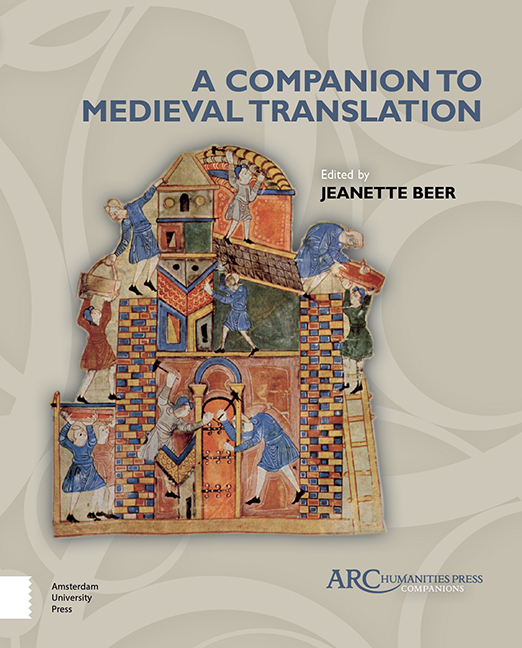Book contents
- Frontmatter
- Contents
- Acknowledgements
- Introduction
- Chapter 1 The European Psalms in Translation
- Chapter 2 The Old French Bible
- Chapter 3 Middle English Religious Translation
- Chapter 4 Bible Translation and Controversy in Late Medieval England
- Chapter 5 Medieval Convent Drama: Translating Scripture and Transforming the Liturgy
- Chapter 6 Translating Romance in Medieval Norway: Marie de France and Strengleikar
- Chapter 7 Christine de Pizan, Translator and Translation Critic
- Chapter 8 Translation, Authority, and the Valorization of the Vernacular
- Chapter 9 Vernacular Translation in Medieval Italy: volgarizzamento
- Chapter 10 Dante and Translation
- Chapter 11 Chaucer and Translation
- Chapter 12 Alchemy and Translation
- Chapter 13 Scientific Translation: A Modern Editor’s Perspectiv
- Chapter 14 Modern Theoretical Approaches to Medieval Translation
- Chapter 15 Observations on Translation by a Thirteenth-Century Maître: Li Fet des Romains
- Epilogue. Observations on Translation by the Oxford Professor of Poetry: Pearl
- General Bibliography
- Appendix
- Index
Chapter 7 - Christine de Pizan, Translator and Translation Critic
Published online by Cambridge University Press: 20 November 2020
- Frontmatter
- Contents
- Acknowledgements
- Introduction
- Chapter 1 The European Psalms in Translation
- Chapter 2 The Old French Bible
- Chapter 3 Middle English Religious Translation
- Chapter 4 Bible Translation and Controversy in Late Medieval England
- Chapter 5 Medieval Convent Drama: Translating Scripture and Transforming the Liturgy
- Chapter 6 Translating Romance in Medieval Norway: Marie de France and Strengleikar
- Chapter 7 Christine de Pizan, Translator and Translation Critic
- Chapter 8 Translation, Authority, and the Valorization of the Vernacular
- Chapter 9 Vernacular Translation in Medieval Italy: volgarizzamento
- Chapter 10 Dante and Translation
- Chapter 11 Chaucer and Translation
- Chapter 12 Alchemy and Translation
- Chapter 13 Scientific Translation: A Modern Editor’s Perspectiv
- Chapter 14 Modern Theoretical Approaches to Medieval Translation
- Chapter 15 Observations on Translation by a Thirteenth-Century Maître: Li Fet des Romains
- Epilogue. Observations on Translation by the Oxford Professor of Poetry: Pearl
- General Bibliography
- Appendix
- Index
Summary
French author, royal adviser, and public intellectual Christine de Pizan (1364– ca. 1430) had extraordinary influence in her lifetime. Her prolific body of work addressed major issues and events of her day, from the Hundred Years War and the Great Schism to the assassination of Louis d’Orléans and the ascendance of Jeanne d’Arc. She openly engaged scholars in debate over the popular but controversial Roman de la Rose, shedding light on the social impact of misogynistic discourse. She memorialized the French king Charles V, and she made herself a mouthpiece for France in poems, treatises, and literary prayers on behalf of the distressed nation, giving voice to the anxieties produced under the protracted crises and conflicts of the late fourteenth and early fifteenth centuries. Remarkably, despite the misogyny of the learned culture of her time, Christine de Pizan was among the most influential voices in the French court. She wrote for numerous patrons of high standing in and around the French royal family, on both sides of the Burgundian-Armagnac conflict, notably including the Queen of France, Isabeau de Bavière. Literary peers such as Eustache Deschamps wrote favorably of her, and the famed Chancellor of the University of Paris Jean Gerson held her in high esteem.
While not known primarily for her translations, Christine de Pizan did engage with translation directly and indirectly throughout her work, both by translating short texts and excerpts from Latin into French and by recognizing the powerful role of translation in the transmission of knowledge. Christine's portrait of Charles V as a champion of a renewed translatio studii in her Livre des fais et bonnes meurs du sage roy Charles V (1404) is in large part a reflection of how she constructs her own authority as the king's commissioned author and as an advisor to his successor, Charles VI. Not only did Christine avail herself of new translations by Charles V's court translators Raoul de Presles and Nicole Oresme, but her own unique situation as a foreign-born woman in the French court allowed her to position herself as a cultural and linguistic ambassador between Italian and French; between Latin and the vernaculars; and between a male-dominated clerical tradition and a feminized laity.
- Type
- Chapter
- Information
- Companion to Medieval Translation , pp. 85 - 96Publisher: Amsterdam University PressPrint publication year: 2019



